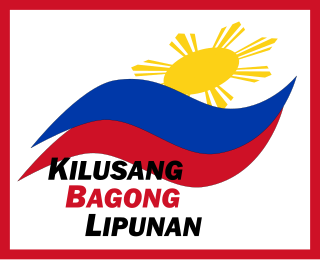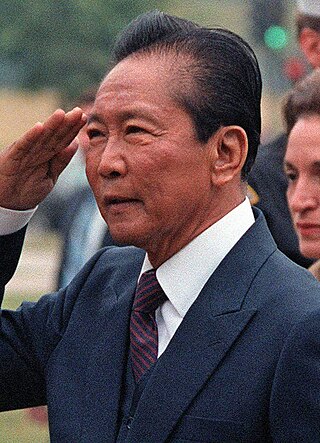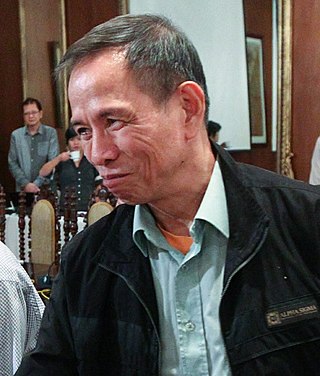Related Research Articles

The Communist Party of the Philippines is a far-left, Marxist–Leninist–Maoist revolutionary organization and communist party in the Philippines, formed by Jose Maria Sison on 26 December 1968. It is designated as a terrorist group by the United States Department of State together with Sison and its armed wing New People's Army (NPA) in 2002. The European Union renewed its terrorist designation on the organization in 2019, though a 2009 ruling by the EU's second highest court delisted Sison as a "person supporting terrorism" and reversed a decision by member governments to freeze assets. According to the US' Central Intelligence Agency (CIA) World Factbook, the CPP and the NPA aims to destabilize the Philippines' economy and overthrow the national government.

Jose Maria Canlas Sison, also known as Joma, was a Filipino writer, poet, and activist who founded and led the Communist Party of the Philippines (CPP) and added elements of Maoism to its philosophy—which would be known as National Democracy. His ideology was formed by applying Marxism–Leninism–Maoism to the history and circumstances of the Philippines.

The New Society Movement, formerly named the New Society Movement of United Nationalists, Liberals, et cetera, is a right-wing political party in the Philippines. It was first formed in 1978 as an umbrella coalition of parties supporting then-President Ferdinand E. Marcos for the Interim Batasang Pambansa and was his political vehicle during his 20-year regime. It was reorganized as a political party in 1986, and is the furthest to the right of the political spectrum among active parties after Marcos' ouster.

The Partido Demokratiko Pilipino is a right-wing political party in the Philippines founded in 1982. It was previously known as Partido Demokratiko Pilipino–Lakas ng Bayan (PDP–Laban) from 1983 to 2024 as a result of a merger with Lakas ng Bayan (Laban). It was part of the country's ruling party coalition from 1986 to 1992 under the administration of Corazon Aquino and the country's ruling party from 2016 to 2022 under the administration of Rodrigo Duterte.

A parliamentary election was held in the Philippines on April 7, 1978, for the election of the 165 regional representatives to the Interim Batasang Pambansa. The leading opposition party, the Lakas ng Bayan (LABAN), ran twenty-one candidates for the Metro Manila area. Their leading candidate was the jailed opposition leader Ninoy Aquino. Marcos regime's party known as the Kilusang Bagong Lipunan (KBL), which was led by the then-First Lady Imelda Marcos. Ninoy was allowed to run by his fellow partymates under the Liberal Party, who boycotted the election and was not allowed to campaign, and so his family campaigned for him. The night before the election on April 6, 1978, a noise barrage was organized by the supporters of (LABAN) which occurred up to dawn.

The Partido Komunista ng Pilipinas-1930 (PKP-1930), also known as the Philippine Communist Party, is a communist party in the Philippines that was established on November 7, 1930. It uses the aforementioned appellation in order to distinguish itself from its better known splinter group, the Communist Party of the Philippines.

Gemiliano "Mel" Lopez Jr. was a Filipino politician who served as the 18th Mayor of Manila from 1988 to 1992 and as OIC - Mayor of Manila from 1986 to 1987 and an assemblyman of the Batasang Pambansa of the Philippines from 1984 to 1986. He was also a former chairman of the Philippine Sports Commission from 1993 to 1996 and the Philippine National Oil Corporation from 2010 until his death in 2017.
Makabayang Koalisyon ng Mamamayan is a coalition of twelve party-lists in the House of Representatives of the Philippines. It was founded on April 16, 2009. The founding assembly was held at UP Theatre, Diliman, Quezon City.
National Democracy (ND) or the National Democratic Left, known colloquially as NatDem, is a political ideology and movement in the Philippines that aims to establish a people's democracy in the country. With the Communist Party of the Philippines as the vanguard party, the movement seeks to address what it deems to be the "root causes of social injustices affecting the Filipino masses" in what is analyzed to be a "semi-colonial and semi-feudal society", by confronting the "three fundamental problems" of imperialism, feudalism, and "bureaucrat capitalism".
Vicente D. Millora was the former chairman of the Kilusang Bagong Lipunan (KBL) party in the Philippines. He previously served as the National President of the Integrated Bar of the Philippines.

The political positions of Rodrigo Duterte, the 16th President of the Philippines, have been difficult to define coherently into what some analysts have attempted to package as "Dutertism" or "Dutertismo" due to numerous policy shifts during his presidency.
Student activism in the Philippines from 1965 to 1972 played a key role in the events which led to Ferdinand Marcos' declaration of Martial Law in 1972, and the Marcos regime's eventual downfall during the events of the People Power Revolution of 1986.

Protests against Former President Rodrigo Duterte escalated on November 18, 2016, following Duterte's support of the burial of the late president Ferdinand Marcos. These series of protests are mostly conducted by progressive groups and other opposing figures mainly due to the ongoing war on drugs, the declaration of martial law in Mindanao, and employment issues such as contractual terms being applied by companies and inflation which occurred due to the passage of the Tax Reform for Acceleration and Inclusion Law. Other causes of the protests include the government's response to the COVID-19 pandemic in the country, the passage of the Anti-Terrorism Act of 2020, and the shutdown and franchise denial of ABS-CBN.
The First Great Rectification Movement refers to a 1965 ideological movement by Filipino communists led by Jose Maria Sison wherein they "criticized, repudiated and rectified the major ideological, political and organizational errors and weaknesses" of the 1930s-era Communist Party of the Philippines. This rectification movement led to the reestablishment of the Communist Party of the Philippines on December 26, 1968 along Marxist–Leninist–Maoist Thought.

Benito Tiamzon was a Filipino political organizer and until his arrest in March 2014 by Philippine security forces, was believed to be the Chairman of the Communist Party of the Philippines (CPP) and its armed wing, the New People's Army (NPA).

Kabataang Makabayan, also known by the acronym KM, is an underground communist youth organization in the Philippines which was active from 1964 to 1975. It was banned by the Philippine government in 1972 when then-President Ferdinand Marcos declared martial law, and was driven underground. It was dissolved in 1975 along with other National Democratic mass organizations, as part of the National Democratic movement's change of strategy against the Marcos regime. Revived within the Manila-Rizal area in 1977 and later nationally in 1984, the organization continues to exist.
Fidel V. Agcaoili, also known as Ka Fidel, was a Filipino activist and revolutionary. He was a member of the Communist Party of the Philippines' Central Committee, along with Jose Maria Sison and Luis Jalandoni during the Marcos dictatorship. In 1974, he was arrested and became the longest detained political prisoner under Marcos, being imprisoned for 11 years. On his release, Agcaoili founded the Samahan ng mga Ex-Detainee Laban sa Detensyon at Aresto (SELDA), a prisoners' rights organization.
The Student Christian Movement of the Philippines (SCMP) is a youth ecumenical national democratic mass organization in the Philippines. It aims to uphold students rights and participates in numerous local and worldwide peoples' advocacies. As with other SCMs around the world, SCMP is a member of the World Student Christian Federation. In the Philippines, it is an associate member of the National Council of Churches in the Philippines (NCCP) and Kalipunan ng Kristiyanong Kabataan sa Pilipinas (KKKP). It is also a member and a founding organization of Kabataan Partylist.
Anakbayan is an international militant youth organization espousing Marxism–Leninism–Maoism and National Democracy based in the Philippines. It is part of the broader Bagong Alyansang Makabayan, a left-wing alliance in the Philippines.

The UniTeam Alliance was an electoral alliance in the Philippines formed to support the candidacies of Bongbong Marcos and Sara Duterte in the 2022 presidential and vice-presidential elections and their allies in the 2022 Philippine general election. The alliance was formalized on November 29, 2021, with Senator Imee Marcos coining the name UniTeam.
References
- ↑ Socrates, Victorino Dennis M. (November 4, 2022). "The Nilo Tayag case revisited". Palawan News. Retrieved December 4, 2022.
- 1 2 3 Cosme, Colleen; Agustin, Carl Martin (1 September 2012). "From guts to Gloria". Philippine Daily Inquirer . Retrieved 21 November 2017.
- 1 2 Pimentel, Benjamin (1991). Rebolusyon!: A Generation of Struggle in the Philippines. NYU Press. p. 98. ISBN 9780853458234.
- ↑ Franco, Jennifer Conroy (2001). Elections and Democratization in the Philippines. Routledge. p. 89. ISBN 0-8153-3734-5.
- ↑ Hilario, Ernesto M. (28 March 2014). "The NPA, a tunnel, and a prison escape plot". Rappler . Retrieved 21 November 2017.
- ↑ "Manila Standard - Google News Archive Search". news.google.com. Retrieved 2022-02-23.
- ↑ "Hardcore FM men quit KBL". Manila Standard . Standard Publications, Inc. January 8, 1988. p. 8. Retrieved June 5, 2021.
- ↑ Holmes, Ronnie (13 May 2016). "Days of Duterte begin" . Retrieved 21 November 2017.
- ↑ Vizcarra, Joseph U. (15 August 2016). "Group of ex-rebels calls support for 'Duterte Revolution'". Business World Online. Retrieved November 21, 2017.
